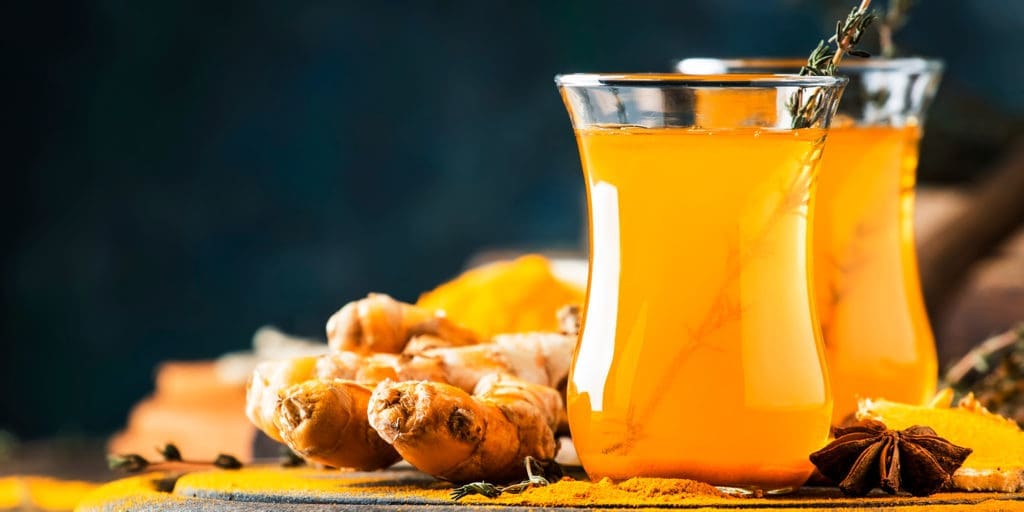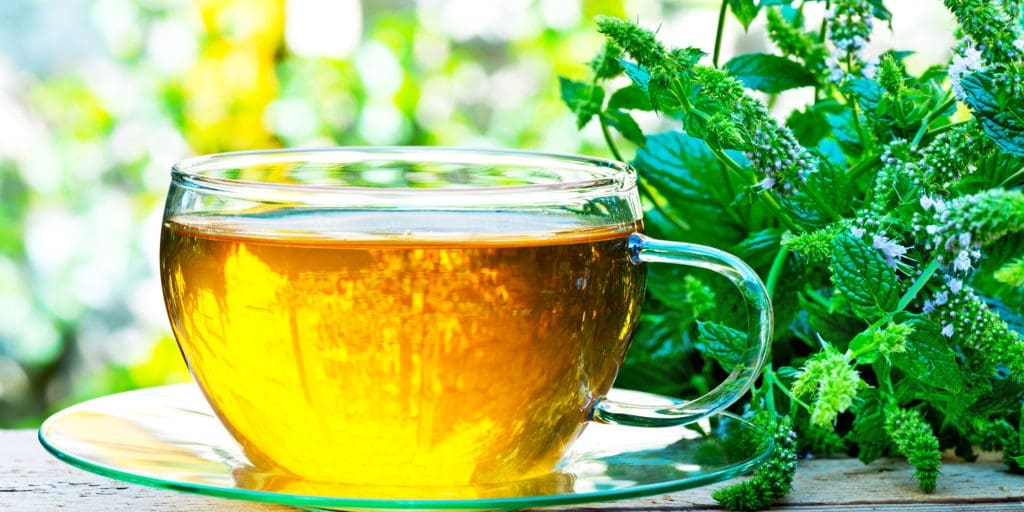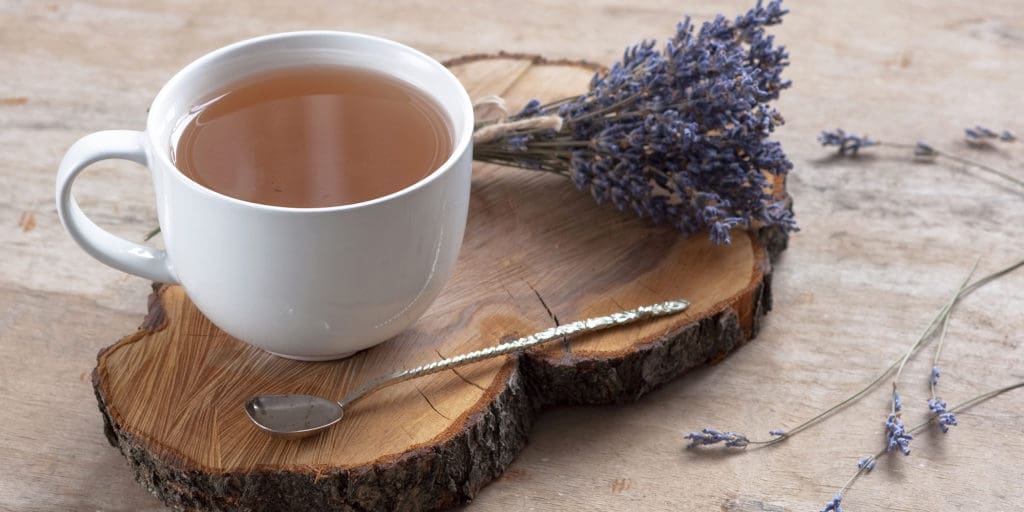Headache? Sore muscles? Inflammation? Instead of reaching for the medicine cabinet, you may find that an effective remedy for your chronic pain could be in your pantry instead. Loved by millions across the globe, teas are a favorite among those looking for home remedies and natural treatments to ease chronic inflammation and pain. There are numerous beneficial ingredients in teas, such as antioxidants called catechins, which can help reduce inflammation. Listed below are four of the most common types of teas that can help reduce chronic inflammation and pain.
Green Tea
 Green tea may be the most well-known, scientifically-researched tea when it comes to reducing inflammation, and is thought to be one of the healthiest drinks on the planet. Green tea is made from the leaves of the Camellia Sinensis plant, more commonly known as the tea plant, and is rich in polyphenols, a type of plant micronutrient, which has been proven to help slow the aging of the brain and improve brain function, help with weight loss, and even protect against certain types of cancer.
Green tea may be the most well-known, scientifically-researched tea when it comes to reducing inflammation, and is thought to be one of the healthiest drinks on the planet. Green tea is made from the leaves of the Camellia Sinensis plant, more commonly known as the tea plant, and is rich in polyphenols, a type of plant micronutrient, which has been proven to help slow the aging of the brain and improve brain function, help with weight loss, and even protect against certain types of cancer.
One of the more well-known health benefits of green tea is its ability to reduce inflammation. Green tea is high in chemicals known as catechins, a type of chemical known as flavonoids that can be found in many different types of fruits, vegetables, and other regularly consumed foods and drinks. Specific catechins known as EGCG (epigallocatechin gallate) have been shown in numerous studies to significantly reduce inflammation. A study conducted by the University of Michigan found that EGCG “inhibited the production of several molecules in the immune system that contributes to inflammation and joint damage in people with rheumatoid arthritis.” The Arthritis Foundation has also backed these claims, adding it to their list of ‘Best Drinks for Arthritis’.
Green tea is widely available and comes in both loose-leaf, and bagged options, however, when choosing a specific brand, look for higher-end brands, as they tend to contain less fluoride. For higher concentrations of antioxidants and catechins like EGCG, reach for matcha powder. Matcha powder is made from the ground leaves of green tea and contains five times the amount of EGCG than regular green tea. For non-green tea lovers, EGCG extract can be taken in the form of over-the-counter supplements, although consulting with a doctor is advised before taking any kind of supplement.
Turmeric Teas


Studies have shown that turmeric can reduce inflammation caused by conditions such as irritable bowel syndrome (IBS) and rheumatoid arthritis (RA). In one study conducted by the Himalayan Institute of Medical Sciences, scientists introduced curcumin on a group of mice with IBS. The mice showed a decrease in intestinal motility and abnormal intestinal contractions; both of which are common symptoms of IBS.
Other similar studies have shown that turmeric may also help to reduce muscle damage and pain in active individuals. A 2012 study conducted by Nirmala Medical Centre in India found that the use of curcumin in patients with RA showed potential to be more effective than standard anti-inflammatory drugs like diclofenac sodium.
Turmeric has become widely available thanks, in part, to recent attention surrounding its health benefits. It is important to note that while studies have shown the benefits of curcumin, turmeric tea itself does not contain as high a level of this beneficial compound as the extract forms used in studies. Over-the-counter forms of curcumin can be found in most health-oriented retailers, however, the use of supplements should be approved by a doctor first.
Peppermint Teas


Peppermint tea and oil have been shown to greatly reduce the pain associated with chronic headaches and migraines. Multiple studies conducted in recent years have shown the ingestion and topical use of peppermint to alleviate and diminish pain equally, and in some cases better, than over-the-counter drugs such as acetaminophen.
A study conducted by the Christian-Albrecht University of Kiel in Kiel, Germany researched the benefits of topically applying peppermint oil to the forehead. Findings from the study showed that a “peppermint oil solution efficiently alleviates tension-type headache,” and that “peppermint oil proves to be a well-tolerated and cost-effective alternative to usual therapies.”
Peppermint tea has also been shown to improve certain digestive functions, and has also been shown to reduce indigestion, nausea, gas, and bloating. While more research is needed to make more accurate claims, there are promising results in studies done on peppermint that point towards its use in treating conditions such as IBS.
Peppermint tea can not only be delicious and aromatic, but it is also packed with nutrients such as potassium, calcium, vitamin A, vitamin C, and folate. On top of all of these amazing health benefits, peppermint tea is also a great breath-freshener!
Lavender Teas


The calming effects of lavender have been known for centuries and are the most commonly used ingredients in most bedtime teas sold today. These calming effects can prove especially helpful for people suffering from conditions such as insomnia and fibromyalgia, both of which have severe effects on an individual’s sleep schedule. These two sleeping disorders often go hand-in-hand, with the Sleep Foundation reporting that, “insomnia often occurs in people with fibromyalgia [and] is commonly used as a marker for a fibromyalgia diagnosis,” and adds that, “insomnia can also worsen fibromyalgia symptoms.”
A study conducted by the Philadelphia College of Osteopathic Medicine in 2017 evaluated three different studies done on lavender’s effect on sleep quality by three independent groups. In all three studies, scientists concluded that aromatherapy with lavender alone improved the sleep quality of nearly all the women observed in the study.
Lavender tea, like many other teas, can help alleviate inflammation, which is a common side effect of many chronic conditions like RA and IBS. However, lavender has also been shown to exhibit antibacterial qualities, and as a result, is often used in its extract form to treat skin conditions such as acne and psoriasis.
Bottom Line on Teas for Pain
Herbal teas and their extracts have proven to be a healthy, all-natural way of alleviating symptoms of chronic conditions such as RA, IBS, and Fibromyalgia. While these remedies may not be a cure on their own, combining them with existing treatments can be a great way of combating pain, while also remaining low-cost.
Higher quality teas are always recommended when choosing a specific tea, as many lower-quality teas can be treated with pesticides and herbicides. Teas should always be stored in a dark, dry place to avoid spoiling. Other teas that are high in health benefits are chamomile, rosehip tea, ginger, cardamom tea, and white teas to name a few.
As with any home remedy or natural treatment, it is important to always consult a doctor beforehand.
What is your favorite herbal tea?
Tell us in the comments section below!
What topics would you like to see Pain Resource cover?
Email us at info@painresource.com with your ideas.
Are you on Facebook?
Join our online community by clicking here.





what shop can you buy your tea from